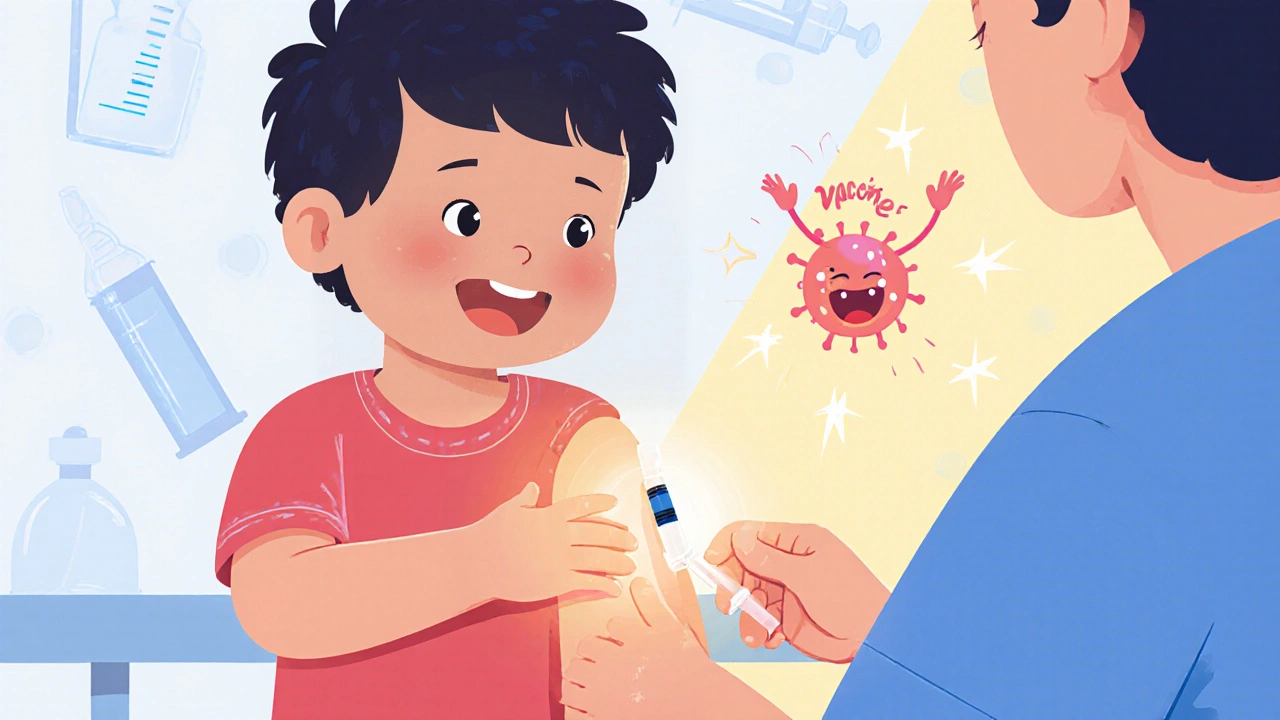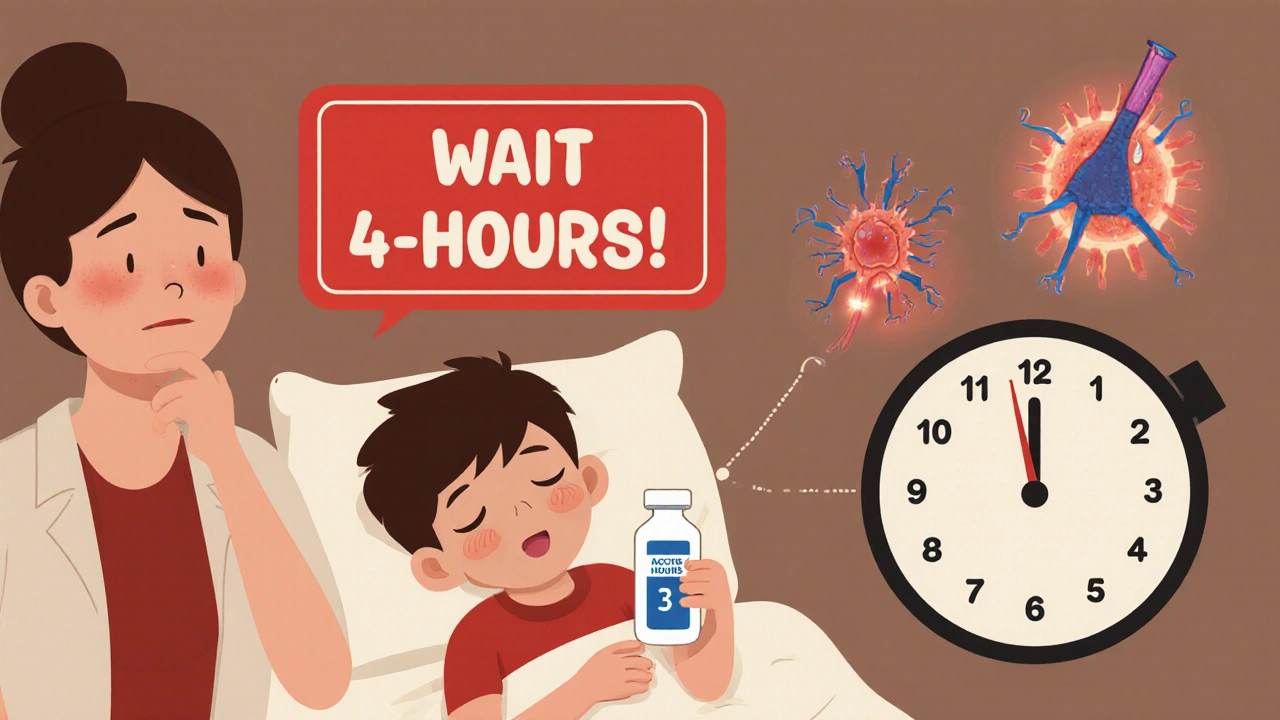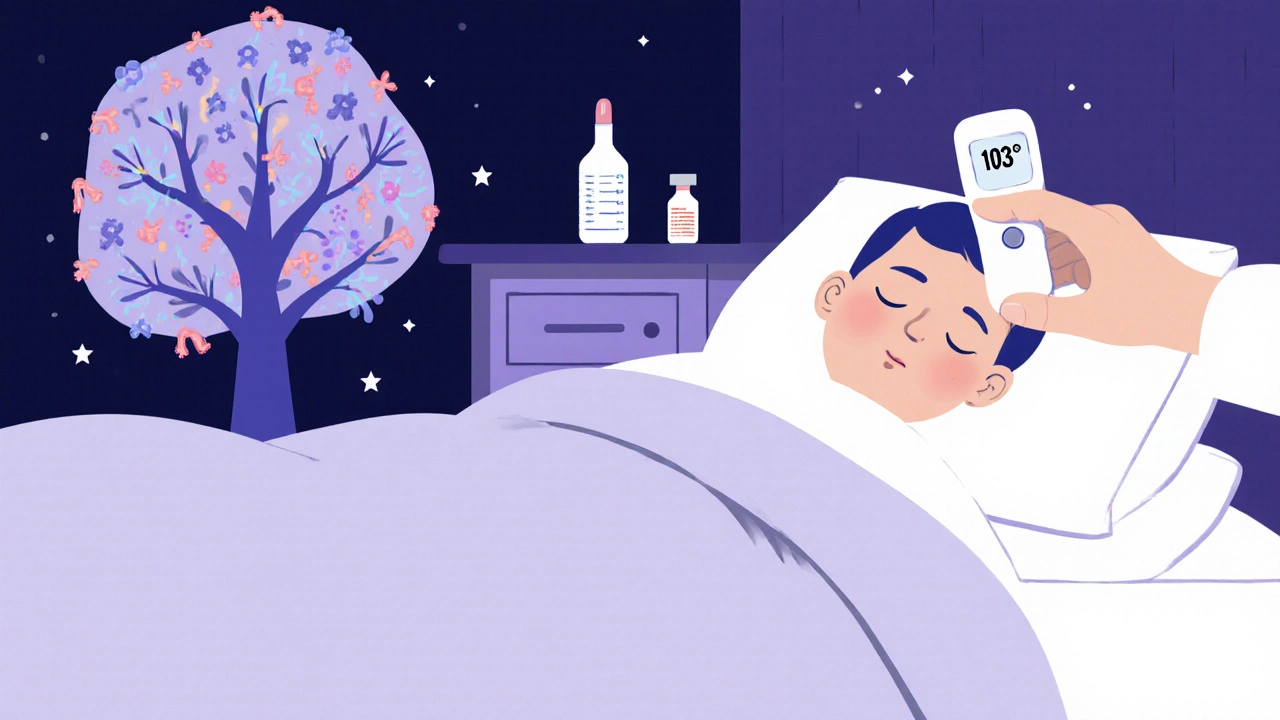Vaccination and Fever Reducers: When to Give Medication to Children
 Nov, 16 2025
Nov, 16 2025
When your child gets vaccinated, it’s normal to worry about fever. Many parents reach for acetaminophen or ibuprofen right after the shot, thinking they’re helping. But giving fever reducers too early might actually weaken how well the vaccine works. The science is clear: vaccination and fever reducers need careful timing.
Why Fever Happens After Vaccines
Fever after vaccination isn’t a bad sign-it’s a sign the immune system is working. Vaccines teach the body to recognize germs by introducing harmless parts of them. Your child’s body responds by raising its temperature slightly, just like it would during a real infection. This helps build stronger, longer-lasting immunity.Not every child gets a fever, but it’s common. For example, about 1 in 3 babies develop a fever after the Prevnar 13 or Pediarix vaccines. The MenB vaccine causes fever in nearly half of infants. Most fevers start within 12 hours and last less than 48 hours. Temperatures below 102°F (39°C) usually don’t need treatment. Even if your child feels fussy or warm, their body is doing exactly what it should.
The Problem with Giving Fever Reducers Too Soon
In the early 2000s, it was common advice to give acetaminophen before or right after vaccines to prevent fever and discomfort. But research changed everything. A landmark 2009 study in The Lancet showed that kids who received fever reducers before vaccination had lower antibody levels afterward. That means their immune systems didn’t respond as strongly to the vaccine.Follow-up studies confirmed this. One study found that giving three doses of acetaminophen-right after the shot, then again at 6 and 12 hours-cut fever rates by half in the first day. But it also reduced antibody responses to several vaccine components by up to 40%. Another study showed that giving ibuprofen or acetaminophen within the first 4 hours after vaccination had the same effect.
The takeaway? Fever reducers don’t just lower temperature-they can quiet down the immune response. If you give them too early, you might be reducing the vaccine’s effectiveness, even if only slightly. And while the antibody levels still stay above protective thresholds, why risk it?
When It’s Safe to Give Fever Reducers
The good news: you don’t have to watch your child suffer. You just need to wait.Experts from the CDC, the American Academy of Pediatrics, and Children’s Hospital of Philadelphia all agree: wait at least 4 hours after vaccination before giving any fever reducer. By then, the immune system has already started its response. Giving medication after that window doesn’t interfere with antibody production.
Only give fever reducers if your child has a temperature above 102°F (39°C) or seems very uncomfortable. For mild fevers between 100°F and 102°F, skip the medicine. Keep them hydrated, dress them lightly, and let their body do its job. Studies show even low-grade fevers help build immunity. Medications like acetaminophen and ibuprofen can reduce your child’s natural immune response-even when they’re not causing harm.

Which Medications Are Safe and How to Dose Them
For children older than 12 weeks, acetaminophen (Tylenol) is the first choice. For kids over 6 months, ibuprofen (Advil, Motrin) is also safe. Never give aspirin-it’s linked to Reye syndrome, a rare but serious illness.Dosing matters. Too little won’t help. Too much can be dangerous.
- For infants 6-11 months (18-23 lbs / 8-10 kg): 1.25 mL of acetaminophen or 2.5 mL of ibuprofen
- Give acetaminophen every 4-6 hours, no more than 4 doses in 24 hours
- Give ibuprofen every 6-8 hours, no more than 4 doses in 24 hours
Always check the label. Liquid formulations vary by brand. Use the syringe or measuring cup that came with the medicine-never a kitchen spoon. If your child is under 12 weeks old and has a fever, call your doctor before giving any medication. Fever in newborns needs immediate medical attention.
The One Big Exception: MenB Vaccine
Not all vaccines are the same. The MenB vaccine, which protects against meningococcal B disease, causes fever in up to 50% of babies. Because of this, the UK’s National Health Service (NHS) recommends giving liquid paracetamol (acetaminophen) after the 8-week and 16-week MenB shots.This is the only major exception to the rule. The NHS decided the risk of high fever and febrile seizures outweighed the small chance of reduced immunity. Other countries, including the U.S., don’t follow this guideline-but if you’re in the UK or your doctor recommends it, follow their advice.

What to Do Instead of Medication
You don’t need medicine to keep your child comfortable. Here’s what actually helps:- Offer extra fluids-breastmilk, formula, or water if they’re older
- Dress them in one light layer, not extra blankets
- Use a lukewarm sponge bath if they’re overheated (never cold water or alcohol)
- Let them rest. Cuddles and quiet time help more than you think
- Monitor their behavior. If they’re alert, drinking, and responding to you, they’re likely fine
Most kids bounce back within a day or two. Fever is temporary. The protection from vaccines lasts for years.
What About Pre-Existing Fever?
If your child already has a low-grade fever when they come in for vaccines, don’t cancel the appointment. The CDC says mild illness-even a slight fever-doesn’t reduce how well vaccines work. Vaccines are safe to give during minor colds, ear infections, or mild diarrhea.Only delay vaccination if your child has a moderate or high fever (above 101.3°F / 38.5°C) or is very unwell. In those cases, wait until they’re better. But don’t delay because of a mild temperature. The benefits of staying on schedule far outweigh the risks.
Final Advice: Wait, Watch, and Act Only When Needed
The goal isn’t to prevent every bump in your child’s temperature. It’s to help them build strong immunity without unnecessary interference. Fever reducers have their place-but timing is everything.Wait at least 4 hours after vaccination. Only give medicine if the fever hits 102°F or higher, or if your child is clearly in distress. Use the right dose. Skip aspirin. And remember: a little fever is a good sign.
Most parents feel better knowing they did the right thing-not by rushing to medicate, but by trusting their child’s body to respond naturally. Vaccines work best when the immune system is allowed to do its job.
Can I give my baby fever medicine before their vaccines?
No. Giving fever reducers like acetaminophen or ibuprofen before vaccination can reduce the immune response to the vaccine. Studies show lower antibody levels in children who received these medications beforehand. Wait until after the shot, and only give medicine if your child develops a fever above 102°F or seems very uncomfortable.
Is it safe to give acetaminophen after a vaccine?
Yes, but wait at least 4 hours after vaccination. Research shows giving acetaminophen more than 4 hours after the shot doesn’t interfere with antibody production. Use the correct dose based on your child’s weight, and never give more than 4 doses in 24 hours.
Should I give fever medicine for a low-grade fever after vaccination?
No. Fevers between 100°F and 102°F are normal and help the immune system respond to the vaccine. Medications like acetaminophen can suppress this natural response. Instead, keep your child hydrated, lightly dressed, and rested. Only treat fevers above 102°F or if your child is in significant discomfort.
What about the MenB vaccine? Should I give medicine before or after?
For the MenB vaccine, the NHS recommends giving liquid paracetamol (acetaminophen) after the 8-week and 16-week doses to reduce the risk of high fever and febrile seizures. This is the only major exception to the general rule. In the U.S., this isn’t standard advice, but if your doctor recommends it, follow their guidance.
Can my child get vaccines if they already have a fever?
Yes, if the fever is mild (below 101.3°F / 38.5°C). The CDC says minor illnesses don’t affect how well vaccines work. Delay vaccination only if your child has a moderate to high fever or is very unwell. Don’t skip vaccines because of a slight temperature-staying on schedule protects them better.
Is ibuprofen safer than acetaminophen after vaccines?
Both can interfere with immune response if given too early. There’s no clear evidence one is safer than the other in terms of vaccine effectiveness. The key is timing: wait at least 4 hours after vaccination before giving either. Choose based on your child’s age, weight, and medical history. Always follow dosing guidelines and never give ibuprofen to babies under 6 months unless directed by a doctor.
How long does vaccine fever usually last?
Most vaccine-related fevers last 1 to 2 days. They usually start within 12 hours of the shot and peak around 24 hours. If the fever lasts longer than 48 hours, gets higher than 104°F, or is accompanied by other symptoms like rash, vomiting, or lethargy, contact your doctor.
Can I give fever medicine and vaccines at the same time?
It’s not recommended. Giving fever reducers at the same time as vaccination can reduce the body’s immune response to the vaccine. Even if your child has a history of high fevers, it’s better to wait and see. If they develop a fever later, treat it then. The goal is protection-not comfort-at the cost of immunity.
Eric Healy
November 16, 2025 AT 21:30So let me get this straight you wanna let a 6 month old scream for 48 hours just so some lab grown proteins can do their job? I got news for you doc, my kid cried till he threw up and i gave him tylenol at 2 hours and he slept like a angel. Science dont care about your feelings.
Shannon Hale
November 17, 2025 AT 16:57Oh my GOD. Are you seriously telling parents to just WATCH their baby burn alive with fever? I mean seriously? You think a 102 fever is "normal"? That’s not normal that’s a medical emergency waiting to happen. I’ve seen kids go into seizures from this exact mindset. You’re not a hero you’re a liability.
Holli Yancey
November 18, 2025 AT 02:44I appreciate the science here but honestly I just do what feels right for my kid. Sometimes they’re fussy but happy, sometimes they’re burning up and sobbing. I’ve given meds at 3 hours before and they turned out fine. Maybe the science is right but every child is different. I’m not gonna guilt myself for loving them through it.
Gordon Mcdonough
November 19, 2025 AT 15:17WTF is this some kind of communist health cult?? You want us to let our kids suffer?? I dont care what some journal says if my baby is crying and hot I give him medicine and that’s it. I dont need some elitist doctor telling me how to parent. I’m american and I do what I want. FUCK YOUR STUDIES.
Jessica Healey
November 21, 2025 AT 12:28my daughter got her 12 month shots and i gave her ibuprofen right after bc she was screaming. she was fine. i dont feel bad. i love her. if science says i hurt her immunity then science can eat it. i’d rather have a happy kid than a statistically stronger immune system.
Levi Hobbs
November 22, 2025 AT 16:10This is such a nuanced topic and I really appreciate the breakdown. I think the key is intentionality - not fear. If your child is in distress, comfort them. If they’re just warm and a little cranky, maybe hold off. The 4-hour window seems like a reasonable middle ground. I’ve seen both sides and I think balance is the real win here.
henry mariono
November 23, 2025 AT 19:52Just wanted to say thank you for writing this. As a dad of two, I used to panic every time a fever showed up. Now I know it’s not the enemy. I still check temps, keep them hydrated, and cuddle them - but I don’t rush to the medicine cabinet anymore. It’s been a game-changer.
Sridhar Suvarna
November 24, 2025 AT 19:08Indian parents have been doing this for generations. We give fever medicine only when the child is truly suffering. We know fever is the body’s way of fighting. We do not fear it. We respect it. Science is just catching up to tradition.
Kelsey Robertson
November 26, 2025 AT 01:19Oh please. The "4-hour rule" is just Big Pharma’s way of selling more medicine later. The real reason they say wait is because they don’t want you to question why vaccines cause fever at all. Why not ask why the immune system is being tricked into overreacting in the first place? This whole thing smells like controlled fear.
Elia DOnald Maluleke
November 27, 2025 AT 23:07Let me offer a philosophical perspective: The fever is not the enemy - the fear of the fever is. We live in an age where discomfort is treated as a disease. But the body’s wisdom is ancient. To medicate instinctively is to distrust evolution. To wait is to honor biology. This is not about vaccines - it is about our relationship with nature itself.
Kiran Mandavkar
November 29, 2025 AT 01:24How quaint. You all treat a child’s immune response like a sacred ritual while ignoring the fact that 90% of parents are working 60-hour weeks and can’t afford to watch their kid scream for 48 hours. Your "science" is a luxury. My kid gets Tylenol at 90 minutes because I have a Zoom call in two hours. Your privilege is showing.
Joseph Peel
December 1, 2025 AT 00:51As a pediatric nurse for 22 years, I’ve seen thousands of post-vaccine reactions. The data is solid: early fever reducers blunt antibody response. But I also know parents are terrified. My advice? Wait 4 hours. If the fever hits 102.5°F and the child is inconsolable - give the medicine. You’re not ruining immunity. You’re being a good parent. And that’s what matters.